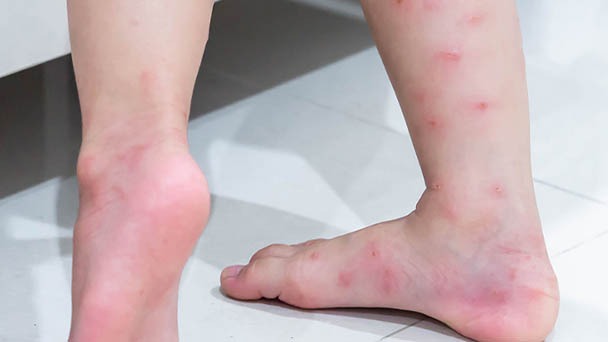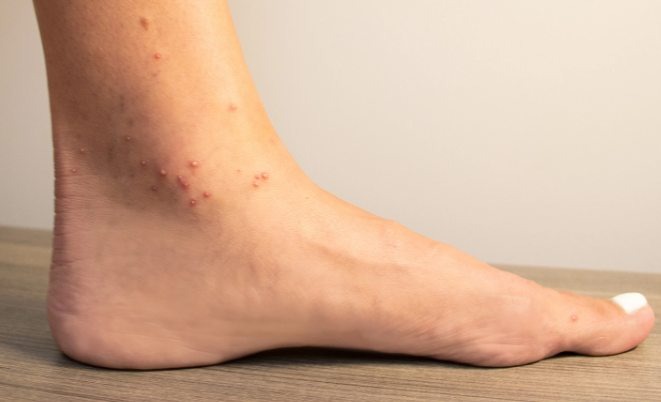How To Get Rid of Ant Bites Overnight - Home Remedies
Written by Ivy
Jan 30 2023

To catch prey, attack prey, and even communicate within their colony, ants use their mandibles as improvised hands. As a result, an ant's mandibles are extremely agile and occasionally quite powerful.
To get rid of ant bites overnight, just wrap some ice cubes in a thin cloth or piece of paper towel and hold it against the area for 15 to 20 minutes. In order to feel relief from the symptoms, repeat this process several times throughout the day.
What Are the Most Common Kinds of Biting Ants?
Although all ants are capable of biting, some have actually perfected the art. Even though it's a painful, excruciatingly uncomfortable form of art, it still counts as art. Who are we to say this isn't art but the macaroni crafts made in our child's first-grade class are? After all, the purpose of art is to evoke strong emotions in the viewer.
Aside from that poetic digression, some ant species bite significantly more than others.
Just a few of the most common types of biting ants include:
- Bullet ants
- Carpenter ants
- Pavement ants
One type of biting ant that is particularly prevalent may have escaped our list, but that is because they merit their own section. We're referring to fire ants.
Fire ants have a secret that makes their bites extremely painful. They can sting, too.
Signs of An Ant Bite
First of all, are you certain that you have been bitten by an ant? If you've ever been bitten by a fire ant, you probably already know how painful and itchy they are. If the ants swarm you, they can also bite in clusters.
Though other ant species are also capable of biting, their bites are typically less painful than those of fire ants. The redness, itching, and general discomfort of these will decrease.
Home Remedies for Ant Bites
Lemon Juice and Baking Soda
A great way to lessen the pain brought on by ant bites is to use baking soda or lemon juice. Apply a tiny amount of lemon juice to the bite or bites by simply squeezing a little juice into a small bowl. You should combine a few teaspoons of baking soda with a very small amount of water to make a paste when using baking soda. Apply the mixture after that to your bites. Whichever option you choose, you should experience relief quickly.
Apple Cider Vinegar
Similar to lemon juice, apple cider vinegar's acidity can lessen the sting of an ant bite. Make sure to combine a little water with the apple cider vinegar before applying it to your skin. Instant relief!
Honey
The last thing you want is for honey to attract ants into your kitchen if it is left out on the counter. However, did you know that applying a few drops of honey to an ant bite can lessen the swelling, itching, and redness associated with the bite? You can get quick relief from ant bites by dabbing a little honey on them.
Cucumber
As it turns out, cucumbers aren't just healthy for eating; they can also relieve the itching brought on by ant bites. Simply apply a thin slice of cucumber to the itchiest bite.
Toothpaste
Similar to baking soda, toothpaste can lessen the burning and itching that are frequently associated with ant bites. Apply some toothpaste to your finger with a small squeeze, then rub it in the bite area. The best toothpaste for this purpose is typically one that contains baking soda.
Salt
Salt is a good substitute for baking soda to reduce the swelling brought on by ant bites if you don't have any on hand. Apply some salt that has been dissolved in a tiny amount of water to the bite site. Right away, you'll start to feel relieved.
Olive Oil
The final home remedy we'll discuss can also be found in the kitchen, just like salt. It may surprise you to learn that olive oil can also soothe an ant bite that is itchy, red, and irritated. This is because it contains oleocanthal, a substance that prevents some inflammatory enzymes from working. You can easily verify this by applying some olive oil to an ant bite.
Do Fire Ants Bite Or Sting?
It is understandable why this query about fire ants is so frequently asked. Fire ants sting as well as bite, which is a resounding "both" in response to the question.
Using their mandibles, fire ants bite and latch onto the skin to attack. The fire ant will then adjust its grip on you before stinging you with its back end. Both of these sensations are undoubtedly unpleasant, but the majority of people find the sting to be much worse.
Because the sting injects venom into the skin, it hurts more than the bite. Instantaneous pain is brought on by this venom. This severe discomfort is often described as a burning sensation by those stung, leading these insects to receive the apt name of "fire ants."

What Do Ant Bites and Stings Feel Like?
An ant bite or sting will likely hurt when it first makes contact. The venom the ant so rudely left behind may be the cause of any aftereffects you experience from the bite.
The venom of some species of ants causes an immediate painful burning sensation. The initial sting and bite, however, can also have long-lasting effects.
On the skin where the ant bit and stung, a tiny, itchy, raised patch is likely to develop. This is a typical response and, while not particularly pleasant, shouldn't raise any red flags. But after that initial reaction, that little patch might develop into a blister that is fluid-filled.
Up to 24 hours after the initial bite, you might notice that the bite is still swollen. The redness and inflammation should start to fade at that point. For about a week afterward, you might continue to experience uncomfortable itching.
If itchiness persists after a week or if the area around the bite continues to swell, there may be a more serious reaction going on.
What Kind of Reaction is Abnormal?
Here are some instances of more unusual reactions since we've established what the typical course of action following an ant bite and sting should be.
You might experience more swelling than others depending on how your body responds to the ant's venom. This can occasionally manifest as swelling elsewhere than at the actual sting site.
For instance, if an ant bites and stings someone on their hand, their entire hand may swell up rather than just the area where it happened. This can be worrying, without a doubt, and it is especially worrying if we see it happening to our children. It is not yet an emergency if this kind of swelling develops, but a trip to the doctor might be a wise choice.
Being safe is always the right choice because we should never jeopardize the health of our family.
When to Seek Medical Help
You might be able to wait until your next doctor's appointment if you or a family member are only having a mildly abnormal reaction to an ant sting or bite. The need to see a doctor right away is however required for some reactions. These reactions include anything that might be a sign of a severe allergy or be potentially fatal.
Here are some of the signs and symptoms that you should look out for:
- Flu-like symptoms
- Fever or chills
- Dizziness
- Nausea, diarrhea, and stomach cramps
- Swelling of the throat
- Trouble breathing
It is time to seek medical attention the moment you notice any of these symptoms. It is better to be safe than sorry even if the alarm turns out to be unfounded.
How to Make An Ant Bite Feel Better Fast
Make it a point to wash the area as soon as possible with soap and water after being bitten or stung by an ant. The additional stinging sensation may deter children in particular, but cleaning the area is necessary to get rid of bacteria.
After completing this step, you can start the process of icing the area for 15 minutes and then leaving the affected skin alone for 15 minutes. After that, too, don't scratch the area; ants, mosquitoes, etc.) is not a good choice.
Make sure the ice or ice pack is covered with a towel so that it does not come into contact with the skin. If it does, a helpful solution might end up doing more harm than good.
How Much Will It Cost Me to Get Rid of Ants and Other Pests
Depending on the pest and the location, pest extermination can be expensive. Ants are typically an easier insect to eradicate. Sadly, they enter your home through cracks and crevices. Expert exterminators or pest control specialists can, however, identify the source of the ant activity and the route they are taking into your house.
A typical exterminator service can run about $150. You might spend $100 or more every three months if you hire a pest control company. This is because pest control is recommended at least quarterly. These fees pay for the expenses associated with removing and keeping your home's perimeter safe.
Also Read How to Get Rid of the Following Species:
Animals:
- Brown Recluse Spiders
- Hornets
- Palmetto Bugs
- Spider Mites
- Water Bugs
- Black Caterpillars
- Grass Flies
- Carpenter Bees
- Beetles
- Scorpions
Conclusion
A first step in eliminating insects is realizing how challenging it is to contain them. A top priority is ensuring that you have effective pest control and that everyone in the house is safe. When at all possible, use natural remedies to prevent any health issues.
FAQs
How Long Do Ant Bites Last
After a few days, ant bites usually disappear. Because fire ants inject more venom into your skin, their stings are more painful and last longer. The average time it takes for a fire ant sting to go away and for you to feel better is three to seven days.
How to Get Rid of Ant Bite Scars
Tretinoin cream, glycolic acid and hydroquinone can help with some fading but it does take a long time. To hide the dark spots, you might want to try using waterproof makeup.
Latest Updated
- Does Peppermint Oil Repel Spiders - Get Rid Of Spiders
- Does Cornmeal Get Rid of Ants - How to Use It
- How Do Exterminators Get Rid Of Mice In Walls - Is It Work?
- How To Control & Get Rid of Nutsedge
- How to Get Rid of Groundhogs Under House Effectively
- How To Get Rid of Ant Bites Overnight - Home Remedies
- How to Get Rid of Brown Recluse Spiders - 2023 Guide
- How To Get Rid of Hornets with Simple Steps
- How to Get Rid of Palmetto Bugs with Simple Methods
- Early Signs of Spider Mites - How to Get Rid of Them
Popular Articles
- Winter maintenance of Antirrhinum Majus
- How to Grow Terminalia Mantaly Tree
- How to Grow and Care for Crossostephium Chinense
- How to grow Antirrhinum Majus in spring
- Peristeria Elata (Dove Orchid) Profile: Info & Care Guide
- Underwatered Snake Plant (Sansevieria Trifasciata) - Signs And How To Fix
- How to Care for Brazilian Jasmine Plant (Mandevilla Sanderi)
- How to Grow & Care for Graptopetalum Purple Delight in Summer
- Rosa Chinensis (China Rose): Plant Growing & Care Tips
- How to Care for Baby Sun Rose (Aptenia Cordifolia)